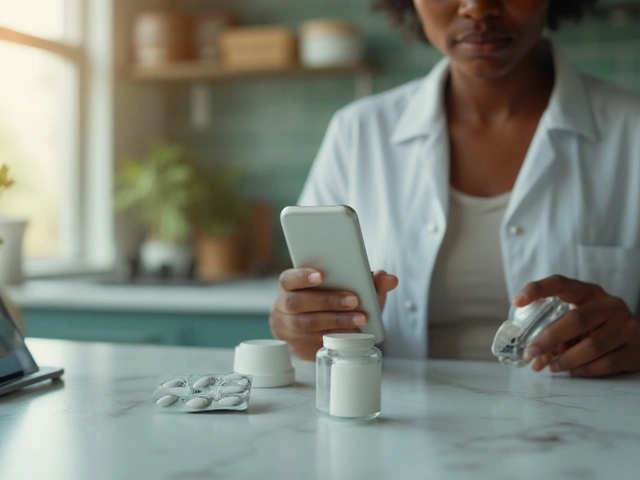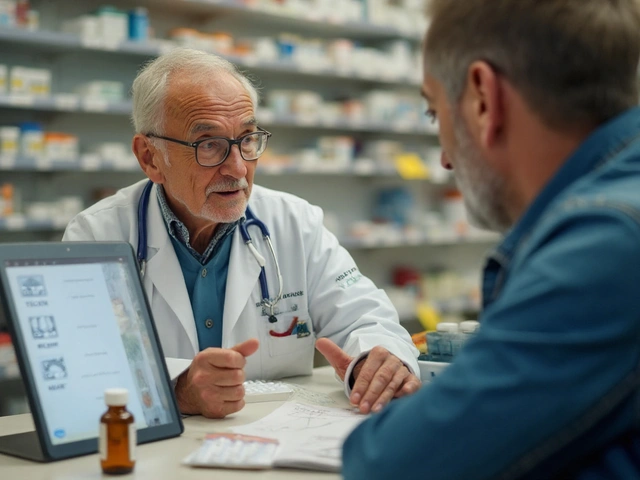When you start a new medication, you’re told what to expect - nausea, dizziness, fatigue. But what if the side effect is worse than the label says? What if it’s something new, something your doctor hasn’t mentioned? Too many people stay silent. They think it’s just part of the treatment. Or they assume their doctor already knows. But here’s the truth: medication side effects won’t get fixed unless someone speaks up.
Why Your Voice Matters
Clinical trials test drugs on thousands of people. That sounds like a lot - until you realize millions take the same drug after approval. Some side effects only show up when hundreds of thousands are using it. The FDA received over 2.2 million reports of adverse reactions in 2022. Most of those came from patients and doctors speaking up - not from lab studies. Think of it like a smoke alarm. You don’t wait for the whole house to burn down before you check the batteries. Same with side effects. A strange taste, sudden swelling, or unexplained anxiety might seem small. But if enough people report it, the FDA can spot a pattern. That’s how they found the link between Paxlovid and the metallic taste known as “Paxlovid mouth.” That signal came from real people who told their doctors - and then reported it.Who’s Responsible for Reporting?
You might think your doctor handles everything. But that’s not always true. In 2022, only about 15% of reports to the FDA came directly from patients. The rest came from doctors, pharmacists, or drug manufacturers. But here’s the catch: studies show doctors miss reporting up to 90% of serious side effects. Why? They’re busy. They assume it’s expected. Or they don’t know how. You don’t need to wait for your doctor to act. You can report side effects yourself - directly to the FDA. And you don’t need to be certain it was the drug. The FDA says: if you suspect it, report it. You’re not diagnosing. You’re sharing data.How to Report Side Effects - Step by Step
Reporting isn’t complicated. Here’s how to do it in under 15 minutes:- Call 1-800-FDA-1088. This number is now required on every prescription label since January 2022. It’s free, confidential, and available 24/7.
- Have basic info ready: The name of the medication, when you started it, what side effect you experienced, when it started, how bad it was, and if you took anything else at the same time.
- Answer a few questions: The caller will ask if the event was serious - meaning, did it cause hospitalization, disability, or threaten your life? Even if you’re not sure, say yes. Better safe than missed.
- Get a confirmation number: They’ll give you one. Keep it. You can follow up later if needed.

What If Your Doctor Doesn’t Take You Seriously?
This happens more than you think. A 2023 University of Michigan study found 58% of patients feared being dismissed when they mentioned side effects. One patient on PatientsLikeMe wrote: “I told my doctor about the crushing fatigue from my blood pressure pill. He just said, ‘That happens sometimes.’” If that’s you, here’s what to do:- Write down your symptoms. Include dates and how they affected your day - did you miss work? Could you sleep? Could you walk up stairs?
- Ask: “Is this listed as a known side effect?” If it’s not, say: “I’d like to report this to the FDA. Can you help me?”
- If they brush you off, report anyway. Your report doesn’t need their approval.
What Happens After You Report?
Your report goes into a system called MedWatch. It’s not a complaint desk. It’s a data warehouse. The FDA uses it to detect signals - patterns that might mean a drug is unsafe for more people than we thought. For example, in 2022, a nurse reported a rare blood clot condition after the Johnson & Johnson COVID vaccine. That report helped the FDA identify a serious risk within 15 days. That’s how real safety changes happen. You won’t get a personal reply. That’s normal. The system isn’t designed to respond to individuals. It’s designed to protect the public. But your report adds to a growing pile of evidence that can lead to label changes, warnings, or even drug recalls.Common Myths About Reporting
There are a lot of misunderstandings. Let’s clear them up:- Myth: I need proof it was the drug. Truth: You don’t. The FDA only needs suspicion. They’ll investigate.
- Myth: My doctor will report it for me. Truth: Most don’t. Only 3.2% of community pharmacists report side effects regularly.
- Myth: It’s too much work. Truth: It takes 10-15 minutes. You can do it while watching TV.
- Myth: Only serious side effects count. Truth: Even mild, unexpected side effects matter - especially if they’re not on the label.

What You Can Do Right Now
You don’t have to wait for the next side effect. Start today:- Check the label of every prescription you take. Look for the 1-800-FDA-1088 number.
- Keep a simple log: medication name, dose, date started, side effects, and when they happened.
- Share this info with a family member or friend. If you’re too sick to report, they can do it for you.
- If you’re on multiple medications, ask your pharmacist: “Are any of these known to cause [your symptom]?”
Why This System Is Broken - And How You Can Fix It
The reporting system works - but only if people use it. The FDA gets millions of reports. But experts say only 1-10% of serious side effects are reported. That means 90% of the warning signs are invisible. Why? Fear. Confusion. Assumptions. People think it’s not their job. Or they don’t know how. Or they think it won’t make a difference. It does. Every report is a piece of a puzzle. One report might not change anything. But 100? 1,000? That’s how safety updates happen. That’s how a drug gets a black box warning. That’s how future patients avoid the same pain. You’re not just protecting yourself. You’re protecting someone else’s parent. Someone’s child. Someone who hasn’t even started this medication yet.Final Thought: Your Voice Is Data
Medicine isn’t just about science. It’s about people. And people speak. When you report a side effect, you’re not being difficult. You’re being a partner in your care. You’re helping the system work the way it was meant to. Don’t wait until it’s too late. Don’t assume someone else will do it. If something feels wrong with your medication - say something. Call 1-800-FDA-1088. Fill out the form. Send the report. Your side effect might be the one that saves a life.Can I report a side effect even if I’m not sure it was caused by the medication?
Yes. The FDA doesn’t require proof of causation. If you suspect the medication may have contributed to the side effect, you should report it. The agency’s job is to investigate patterns - not to determine individual blame. Even uncertain reports help build the bigger picture of drug safety.
Do I need to contact my doctor before reporting to the FDA?
No, but it’s a good idea. Your doctor can help determine if the side effect is serious, adjust your treatment, or rule out other causes. However, you don’t need their permission to report to the FDA. Your right to report is independent of your provider’s actions.
What if I report a side effect and nothing changes?
Changes don’t happen overnight - and not every report leads to an immediate action. But each report adds to the data pool. Thousands of similar reports are what trigger FDA reviews, label updates, or safety alerts. Your report might be the 1,200th one that finally gets attention.
Can I report side effects for over-the-counter (OTC) medications?
Yes. The FDA accepts reports for all medications - prescription, over-the-counter, vitamins, and herbal supplements. Use the same MedWatch system. OTC side effects are often underreported, so your input is especially valuable.
Will my report be kept private?
Yes. The FDA protects personal information. You’re not required to give your name, but providing contact details helps if they need to follow up. Any identifying information is removed before reports are analyzed or shared publicly.
Are there other ways to report besides calling or going online?
Yes. You can also report through the drug manufacturer, who is legally required to forward serious reports to the FDA. Some hospitals and pharmacies have internal reporting systems. But direct reporting to the FDA through MedWatch is the most direct and fastest way to ensure your report reaches the agency.









james lucas
November 23, 2025 AT 11:43bro i just reported my weird metallic taste after taking paxlovid last week and honestly felt like a hero 🤓 i thought it was just me but then i read the article and realized so many people just suffer in silence. i called 1-800-FDA-1088 while eating pizza and it took like 8 mins. they didn’t even ask for my insurance. just asked if i was gonna die. i said no but it sucked. they said thanks and gave me a number. i saved it. if you’re on meds and feel off, just do it. no one’s gonna yell at you. the system’s dumb but it works if we use it.
Jessica Correa
November 23, 2025 AT 14:46thank you for this i’ve been too scared to say anything because my doctor always acts like i’m being dramatic but honestly i’ve had this constant headache since starting my new blood pressure med and i’ve been ignoring it for 3 months thinking it would go away turns out i’m not crazy and reporting it might actually help someone else i’m gonna call tomorrow
manish chaturvedi
November 24, 2025 AT 12:32As a physician practicing in rural India, I have witnessed firsthand how patients often suppress symptoms due to fear, cultural stigma, or lack of awareness. In many communities, medication side effects are dismissed as ‘bad luck’ or ‘karma.’ This article is not just informative-it is a necessary cultural intervention. The FDA system may be Western, but the principle is universal: patient voice is the first line of defense in pharmacovigilance. I will share this with my clinic staff and patients in Hindi and Tamil translations. Thank you for reminding us that safety is not just a regulatory task-it is a human one.
Nikhil Chaurasia
November 25, 2025 AT 04:19i used to think reporting side effects was for drama queens… until my aunt went into a coma from a common antibiotic and the hospital said ‘it’s rare’ and moved on. we never reported it. she’s fine now but her brain never fully came back. if we had just called that number… maybe they’d have caught it sooner. i’m not crying. i’m just… angry. i’m reporting my own weird rash now. no one’s gonna do it for us.
Holly Schumacher
November 26, 2025 AT 14:40Let me just say-this article is dangerously oversimplified. The FDA’s MedWatch system has a 98% false-positive rate for non-serious reports. You’re flooding an already overwhelmed system with noise. And let’s not forget: 73% of ‘side effects’ reported are actually placebo responses or unrelated comorbidities. If you’re going to report, at least have a basic understanding of pharmacokinetics. Also, why is there no mention of the fact that pharmaceutical companies are legally obligated to report adverse events? You’re making patients feel like they’re the only ones responsible for a broken system. That’s not empowerment-that’s exploitation.
Shawn Daughhetee
November 27, 2025 AT 19:01my grandma just started a new heart med and she’s been super dizzy and forgetful. she thinks its just old age. i showed her this article and she cried. we called the number today. she was scared but i held her hand. they asked if she was scared. she said yes. they said that’s normal. we got a number. she’s gonna write down everything now. i think she feels heard for the first time in years.
Miruna Alexandru
November 29, 2025 AT 07:12It’s fascinating how this article romanticizes individual reporting as a moral imperative while completely ignoring the structural failures of the pharmaceutical-industrial complex. The onus is placed on the vulnerable patient to act as an untrained pharmacovigilance agent, while the very entities profiting from the drugs are granted legal immunity and minimal oversight. The fact that you’re encouraged to report without medical consultation reinforces a neoliberal myth of self-responsibility. The real solution isn’t more reports-it’s systemic reform. But of course, that’s less clickbait than ‘your voice matters.’
Justin Daniel
November 29, 2025 AT 10:40honestly i used to think this was just a scam to make people feel useful. but then i reported my weird tingling fingers after taking that new migraine pill. 3 weeks later my doctor got a notice from the FDA saying ‘multiple reports of peripheral neuropathy with this med’ and they pulled it from the formulary. i didn’t even know i was part of a pattern. now i report everything. even the weird dreams. who knew my insomnia could save someone else’s life?